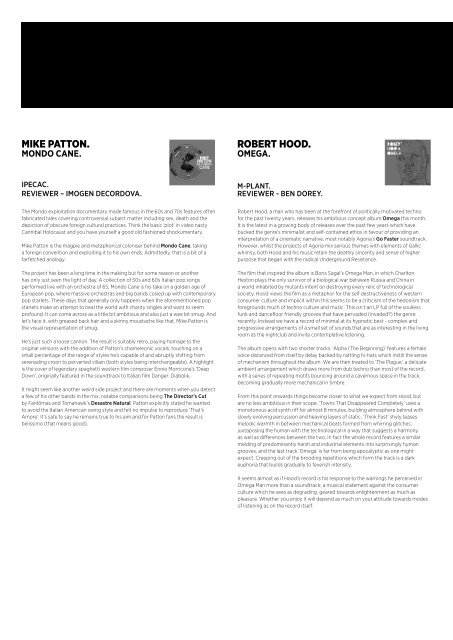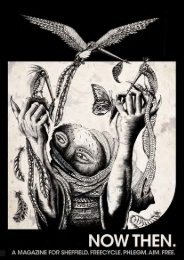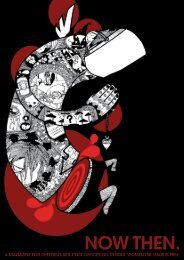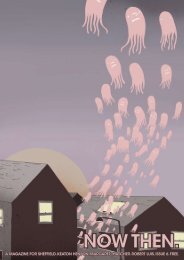arbourthorne - Now Then
arbourthorne - Now Then
arbourthorne - Now Then
You also want an ePaper? Increase the reach of your titles
YUMPU automatically turns print PDFs into web optimized ePapers that Google loves.
SOUND.<br />
PATTON IS GOD. ROBERT HOOD.<br />
ROLO TOMASSI. RICHARD HAWLEY.<br />
MIKE PATTON.<br />
MONDO CANE.<br />
ROBERT HOOD.<br />
OMEGA.<br />
ROLO TOMASSI.<br />
COSMOLOGY.<br />
Richard Hawley.<br />
False Lights From The Land.<br />
IPECAC.<br />
REVIEWER – Imogen DeCordova.<br />
m-plant.<br />
REVIEWER - BEN DOREY.<br />
HASSLE RECORDS.<br />
REVIEWER - ALEX TURNER.<br />
Mute<br />
REVIEWER - Lambertus Prent.<br />
The Mondo exploitation documentary made famous in the 60s and 70s features often<br />
fabricated tales covering controversial subject matter including sex, death and the<br />
depiction of obscure foreign cultural practices. Think the basic ‘plot’ in video nasty<br />
Cannibal Holocaust and you have yourself a good old fashioned shockumentary.<br />
Mike Patton is the magpie and metaphorical coloniser behind Mondo Cane, taking<br />
a foreign convention and exploiting it to his own ends. Admittedly, that is a bit of a<br />
farfetched analogy.<br />
The project has been a long time in the making but for some reason or another<br />
has only just seen the light of day. A collection of 50s and 60s Italian pop songs<br />
performed live with an orchestra of 65, Mondo Cane is his take on a golden age of<br />
European pop, where massive orchestras and big bands cosied up with contemporary<br />
pop starlets. These days that generally only happens when the aforementioned pop<br />
starlets make an attempt to heal the world with charity singles and want to seem<br />
profound. It can come across as a little bit ambitious and also just a wee bit smug. And<br />
let’s face it, with greased back hair and a skinny moustache like that, Mike Patton is<br />
the visual representation of smug.<br />
He’s just such a loose cannon. The result is suitably retro, paying homage to the<br />
original versions with the addition of Patton’s chameleonic vocals, touching on a<br />
small percentage of the range of styles he’s capable of and abruptly shifting from<br />
serenading croon to perverted villain (both styles being interchangeable). A highlight<br />
is the cover of legendary spaghetti western film composer Ennio Morricone’s ‘Deep<br />
Down’, originally featured in the soundtrack to Italian film Danger: Diabolik.<br />
It might seem like another weird side project and there are moments when you detect<br />
a few of his other bands in the mix, notable comparisons being The Director’s Cut<br />
by Fantômas and Tomahawk’s Desastre Natural. Patton explicitly stated he wanted<br />
to avoid the Italian American swing style and felt no impulse to reproduce ‘That’s<br />
Amore’. It’s safe to say he remains true to his aim and for Patton fans the result is<br />
belissimo (that means good).<br />
Robert Hood, a man who has been at the forefront of politically motivated techno<br />
for the past twenty years, releases his ambitious concept album Omega this month.<br />
It is the latest in a growing body of releases over the past few years which have<br />
bucked the genre’s minimalist and self-contained ethos in favour of providing an<br />
interpretation of a cinematic narrative, most notably Agoria’s Go Faster soundtrack.<br />
However, whilst the projects of Agoria mix serious themes with elements of Gallic<br />
whimsy, both Hood and his music retain the deathly sincerity and sense of higher<br />
purpose that began with the radical Underground Resistance.<br />
The film that inspired the album is Boris Sagal’s Omega Man, in which Charlton<br />
Heston plays the only survivor of a biological war between Russia and China in<br />
a world inhabited by mutants intent on destroying every relic of technological<br />
society. Hood views the film as a metaphor for the self destructiveness of western<br />
consumer culture and implicit within this seems to be a criticism of the hedonism that<br />
foregrounds much of techno culture and music. This isn’t an LP full of the soulless<br />
funk and dancefloor friendly grooves that have pervaded (invaded?) the genre<br />
recently. Instead we have a record of minimal at its hypnotic best - complex and<br />
progressive arrangements of a small set of sounds that are as interesting in the living<br />
room as the nightclub and invite contemplative listening.<br />
The album opens with two shorter tracks. ‘Alpha (The Beginning)’ features a female<br />
voice distanced from itself by delay backed by rattling hi-hats which instill the sense<br />
of mechanism throughout the album. We are then treated to ‘The Plague’, a delicate<br />
ambient arrangement which draws more from dub techno than most of the record,<br />
with a series of repeating motifs bouncing around a cavernous space in the track,<br />
becoming gradually more mechanical in timbre.<br />
From this point onwards things become closer to what we expect from Hood, but<br />
are no less ambitious in their scope. ‘Towns That Disappeared Completely’ uses a<br />
monotonous acid synth riff for almost 8 minutes, building atmosphere behind with<br />
slowly evolving percussion and heaving layers of static. ‘Think Fast’ shyly teases<br />
melodic warmth in between mechanical beats formed from whirring glitches,<br />
juxtaposing the human with the technological in a way that suggests a harmony<br />
as well as differences between the two. In fact the whole record features a similar<br />
melding of predominantly harsh and industrial elements into surprisingly human<br />
grooves, and the last track ‘Omega’ is far from being apocalyptic as one might<br />
expect. Creeping out of the brooding repetitions which form the track is a dark<br />
euphoria that builds gradually to feverish intensity.<br />
It seems almost as if Hood’s record is his response to the warnings he perceived in<br />
Omega Man more than a soundtrack; a musical statement against the consumer<br />
culture which he sees as degrading, geared towards enlightenment as much as<br />
pleasure. Whether you enjoy it will depend as much on your attitude towards modes<br />
of listening as on the record itself.<br />
Sheffield’s prog/math/hardcore punishers Rolo Tomassi have been surfing a swollen<br />
hype-wave for several years now. Their self-titled 2006 EP and the Hysterics longplayer<br />
from two years later attracted plaudits aplenty, as well as unlikely support<br />
slots with the likes of Jane’s Addiction. Marked out by their ability to spin on a dime<br />
from hyper-fast technical metal riffing into languorous electronic interludes (and by<br />
singer Eva Spence’s uncanny talent for switching her vocals accordingly), things have<br />
recently gone nuclear for the group with the involvement of uber-producer Wesley<br />
“Diplo” Pentz. Following on from a namecheck in a Pitchfork interview, the possibility<br />
of blagging a remix from the Major Lazer man snowballed into him producing<br />
Cosmology, a departure for an individual better known for his globe-plundering<br />
remixes than for his punk tendencies. However, a quick listen to some of Diplo’s more<br />
far-out mixtapes reveals that there are few musical pies into which he’s not prepared<br />
to stick his fingers, and here the marriage yields fine results.<br />
Cosmology’s superficial similarity to its precedessors will offer comfort to any fans<br />
sweating on appearances from such Diplo calling cards as dancehall MCs, favela<br />
beats or 80s pop samples. Rolo Tomassi’s base elements - beguiling synth warbles,<br />
crunching guitar work and Eva’s abrasive growl - are present and correct from the<br />
outset, though it soon becomes apparent that the band has evolved into a leaner and<br />
more efficient beast. The brutal opening three-track salvo is dispatched in less than<br />
four minutes, while the real benefit of having a dance producer on board is apparent<br />
in the newly crisp and muscular sound.<br />
Luckily though, Cosmology isn’t simply a case of “more of the same, but slightly<br />
better”. The appropriately titled ‘Party Wounds’ finds the familiar sonic assault<br />
squirming on top of a taut, almost disco-punk rhythm. Meanwhile the LP’s far longer<br />
second half refuses to drag as it might. Instead it finds the band stretching out<br />
through a series of more expansive tracks, maintaining tension through confident<br />
use of light and shade that makes some of their earlier efforts sound almost slapdash<br />
by comparison. ‘Tongue-in-Chic’ is particularly effective, moving by degrees from<br />
gleeful shrieks of “you are null and void” into an epic midsection and delicate outro.<br />
And the closing title-track lays off the aggression, deploying an almost Beach Houseesque<br />
level of surfy melancholy before being carried towards the finish line by pulsing<br />
basslines.<br />
While this is the most overtly tuneful part of Cosmology, further listens reveal both<br />
how much melody is employed throughout the album, and how little time and space<br />
is wasted over its 35-minute duration. Their audience may remain limited by their<br />
uncompromising style, but there’s no doubt that Rolo Tomassi are a group at the top<br />
of their game.<br />
False Lights From The Land is a collection of four tracks loosely based around<br />
the theme of the ocean, following on from Hawley’s recent BBC Radio 2 series The<br />
Ocean, in which he discussed the significance of the sea and its effect on British<br />
music and culture.<br />
The title is taken from a lyric from ‘Remorse Code’, a track from last year’s Truelove’s<br />
Gutter and the EP’s opener. Spanning almost ten minutes, it is a rambling slowburner<br />
that uses a wrecked ship as an extended metaphor. “Those white lines / Made your<br />
eyes wide.” No prizes for guessing what that one’s about then...<br />
‘Shallow Brown’ is perhaps the most un-Hawley offering here - an a cappella<br />
performance of a West Indian shanty. Reinterpreted and embellished with the help<br />
of folk duo the Smoke Fairies, it returns to a familiar refrain as it tells the tale of a man<br />
leaving his love for the uncertain sea. The vocal harmonies deployed give this song<br />
a distinctly gospel feel. At three minutes it’s over before you know it and you are<br />
skipping back to get another dose.<br />
‘The Ellan Vannin Tragedy’ is a proper English folk song, originally penned by 60s folk<br />
group the Spinners. Lyrically, it is about a particularly brutal ship wreck off the coast<br />
of Liverpool in 1909 that killed 36 people on their way from the Isle of Man. A fairly<br />
standard folk theme, then, but what is interesting about this is Hawley’s take on the<br />
melody. Though he sticks quite strictly to the original, the cadence of the lyric itself<br />
brings out the warm, saccharine quality of his voice in a different way to most of his<br />
own pieces. Instead of occupying the hazy, lilting territories of his last two albums,<br />
this one has a despairing, sinister tone. I like it.<br />
‘There’s A Storm A Comin’’ sounds a bit like a recent b-side, using the standard<br />
Hawley template of a care-free melodic vocal delivery and broken hearted crooning.<br />
Not the most exciting track here – perhaps even the least exciting – but no doubt it<br />
will prove popular with fanatics, of which there are very many.<br />
The most interesting points of False Lights From The Land see Hawley stretching<br />
himself, playing outside his comfort zone and doing something a bit different. This<br />
will always be the case with covers, but he should take inspiration from this excursion<br />
and inject a new vigor into his own compositions.<br />
Besides, none of these nautical tales is a patch on ‘The Ocean’ from Coles Corner.<br />
PAGE 43.












